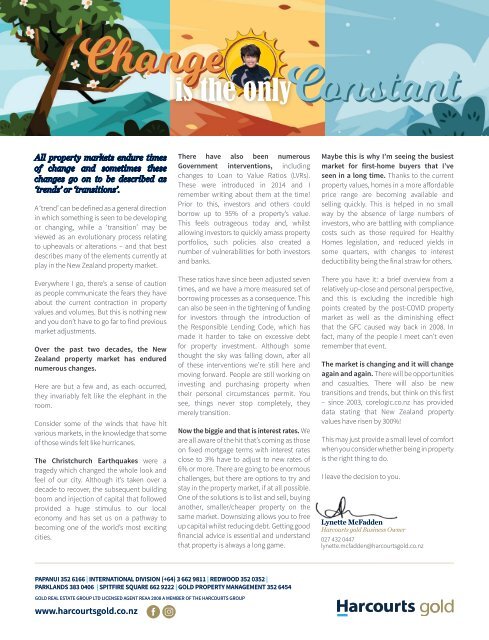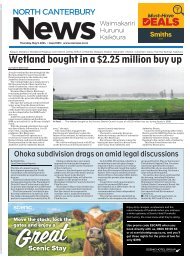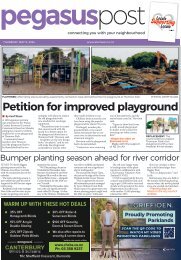03 Magazine: March 31, 2023
You also want an ePaper? Increase the reach of your titles
YUMPU automatically turns print PDFs into web optimized ePapers that Google loves.
is the only<br />
Change<br />
Constant<br />
All property markets endure times<br />
of change and sometimes these<br />
changes go on to be described as<br />
‘trends’ or ‘transitions’.<br />
A ‘trend’ can be defined as a general direction<br />
in which something is seen to be developing<br />
or changing, while a ‘transition’ may be<br />
viewed as an evolutionary process relating<br />
to upheavals or alterations – and that best<br />
describes many of the elements currently at<br />
play in the New Zealand property market.<br />
Everywhere I go, there’s a sense of caution<br />
as people communicate the fears they have<br />
about the current contraction in property<br />
values and volumes. But this is nothing new<br />
and you don’t have to go far to find previous<br />
market adjustments.<br />
Over the past two decades, the New<br />
Zealand property market has endured<br />
numerous changes.<br />
Here are but a few and, as each occurred,<br />
they invariably felt like the elephant in the<br />
room.<br />
Consider some of the winds that have hit<br />
various markets, in the knowledge that some<br />
of those winds felt like hurricanes.<br />
The Christchurch Earthquakes were a<br />
tragedy which changed the whole look and<br />
feel of our city. Although it’s taken over a<br />
decade to recover, the subsequent building<br />
boom and injection of capital that followed<br />
provided a huge stimulus to our local<br />
economy and has set us on a pathway to<br />
becoming one of the world’s most exciting<br />
cities.<br />
There have also been numerous<br />
Government interventions, including<br />
changes to Loan to Value Ratios (LVRs).<br />
These were introduced in 2014 and I<br />
remember writing about them at the time!<br />
Prior to this, investors and others could<br />
borrow up to 95% of a property’s value.<br />
This feels outrageous today and, whilst<br />
allowing investors to quickly amass property<br />
portfolios, such policies also created a<br />
number of vulnerabilities for both investors<br />
and banks.<br />
These ratios have since been adjusted seven<br />
times, and we have a more measured set of<br />
borrowing processes as a consequence. This<br />
can also be seen in the tightening of funding<br />
for investors through the introduction of<br />
the Responsible Lending Code, which has<br />
made it harder to take on excessive debt<br />
for property investment. Although some<br />
thought the sky was falling down, after all<br />
of these interventions we’re still here and<br />
moving forward. People are still working on<br />
investing and purchasing property when<br />
their personal circumstances permit. You<br />
see, things never stop completely, they<br />
merely transition.<br />
Now the biggie and that is interest rates. We<br />
are all aware of the hit that’s coming as those<br />
on fixed mortgage terms with interest rates<br />
close to 3% have to adjust to new rates of<br />
6% or more. There are going to be enormous<br />
challenges, but there are options to try and<br />
stay in the property market, if at all possible.<br />
One of the solutions is to list and sell, buying<br />
another, smaller/cheaper property on the<br />
same market. Downsizing allows you to free<br />
up capital whilst reducing debt. Getting good<br />
financial advice is essential and understand<br />
that property is always a long game.<br />
Maybe this is why I’m seeing the busiest<br />
market for first-home buyers that I’ve<br />
seen in a long time. Thanks to the current<br />
property values, homes in a more affordable<br />
price range are becoming available and<br />
selling quickly. This is helped in no small<br />
way by the absence of large numbers of<br />
investors, who are battling with compliance<br />
costs such as those required for Healthy<br />
Homes legislation, and reduced yields in<br />
some quarters, with changes to interest<br />
deductibility being the final straw for others.<br />
There you have it: a brief overview from a<br />
relatively up-close and personal perspective,<br />
and this is excluding the incredible high<br />
points created by the post-COVID property<br />
market as well as the diminishing effect<br />
that the GFC caused way back in 2008. In<br />
fact, many of the people I meet can’t even<br />
remember that event.<br />
The market is changing and it will change<br />
again and again. There will be opportunities<br />
and casualties. There will also be new<br />
transitions and trends, but think on this first<br />
– since 20<strong>03</strong>, corelogic.co.nz has provided<br />
data stating that New Zealand property<br />
values have risen by 300%!<br />
This may just provide a small level of comfort<br />
when you consider whether being in property<br />
is the right thing to do.<br />
I leave the decision to you.<br />
Lynette McFadden<br />
Harcourts gold Business Owner<br />
027 432 0447<br />
lynette.mcfadden@harcourtsgold.co.nz<br />
PAPANUI 352 6166 | INTERNATIONAL DIVISION (+64) 3 662 9811 | REDWOOD 352 <strong>03</strong>52 |<br />
PARKLANDS 383 0406 | SPITFIRE SQUARE 662 9222 | GOLD PROPERTY MANAGEMENT 352 6454<br />
GOLD REAL ESTATE GROUP LTD LICENSED AGENT REAA 2008 A MEMBER OF THE HARCOURTS GROUP<br />
www.harcourtsgold.co.nz


















